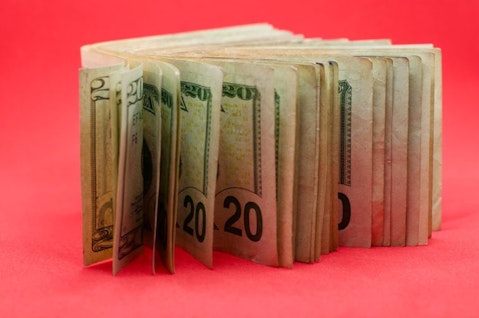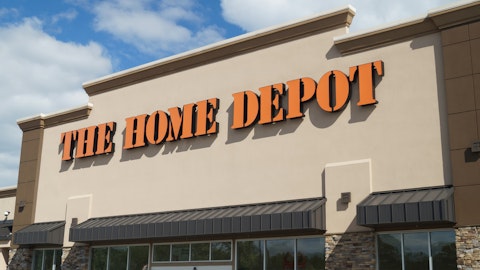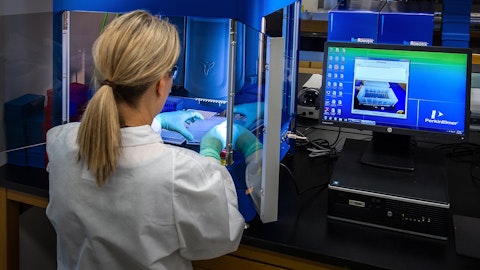In this article, we will be taking a look at 10 long-term dividend stocks to buy right now. To skip our detailed analysis of these stocks and dividend investing, you can go directly to our article This Is the Best Time to Buy These 5 Long-Term Dividend Stocks.
For the long-term, tax-paying investor, strategic investment policies focusing on passive income are the ones that work the best. Investment portfolios including reliable dividend stocks have the potential to deliver strong long-term returns even if the market is unfavorable to most stocks. In addition, the fact that a company is able to consistently pay a dividend, while also raising its payouts year after year, is generally a sign that the company has stronger balance sheets and profitability relative to non-dividend-paying companies.
As a result of the above, stable dividend stocks such as Exxon Mobil Corporation (NYSE:XOM), Chevron Corporation (NYSE:CVX), and AbbVie Inc. (NYSE:ABBV) have typically been among the few securities investors never grow tired of. This is because dividends account for over 40% of a company’s total return. This has been an observable trend over more than 90 years until 2015, according to a Morgan Stanley publication on dividend investing. These stocks have also historically outperformed their non-dividend-paying counterparts. From 1991 to 2015, dividend stocks outperformed non-dividend-payers, since the former had an average annual return of 9.7% while the latter’s average annual return was 4.18%. Additionally, those stocks which consistently raise their yields annually also outperformed the S&P 500 benchmark in 17 out of the 23 years between 1991 and 2015.
A BlackRock Equity Dividend Fund report from this April also showed that in 2022, dividend stocks comprising this fund outperformed the broad S&P 500 over the 12-month period that ended April 30. Additionally, according to a Barron’s article published this May, between 1999 and 2019, dividend-payers with higher payout ratios had an annual return of 10.9%, compared to a 6.6% annual return for those companies with low payout ratios.

Photo by Dan Dennis on Unsplash
Methodology
We picked strong dividend stocks that also have long-term growth potential. These companies are defensive plays that are positioned to stray strong during the tough economic situation heading towards us in 2023 and beyond. That’s why analysts believe now is the right time to pile into these stocks.
Long-Term Dividend Stocks to Buy Right Now
10. McDonald’s Corporation (NYSE:MCD)
Number of Hedge Fund Holders: 58
Dividend Yield as of November 1: 2.23%
McDonald’s Corporation (NYSE:MCD) is a consumer discretionary company operating in the restaurant business. It operates and franchises McDonald’s restaurants in the US and abroad. The company is based in Chicago, Illinois.
On October 20, Jeffrey Bernstein at Barclays reiterated an Overweight rating on McDonald’s Corporation (NYSE:MCD) shares. The analyst also placed a $270 price target on the stock.
This October, McDonald’s Corporation (NYSE:MCD) beat estimates in the third quarter and rallied in the market. The company’s global comparable sales were up by 9.5%, compared to the 5.8% consensus estimate. US comparable sales were also up by 6.1%. According to Valuentum analysts, a compound annual revenue growth rate of 6.2.% can be expected from McDonald’s Corporation (NYSE:MCD) during the next five years, which is a significantly higher figure than the company’s three-year historical compound annual growth rate of 3.4%. The company’s goal to become 95% franchised in the long run will also help it avoid inflationary pressures and most operating problems.
Bridgewater Associates was the largest stakeholder in McDonald’s Corporation (NYSE:MCD) in the second quarter, holding 2.1 million shares, worth about $511.4 million. In total, 58 funds were long the stock with a total stake value of $2.7 billion.
McDonald’s Corporation (NYSE:MCD), like Exxon Mobil Corporation (NYSE:XOM), Chevron Corporation (NYSE:CVX), and AbbVie Inc. (NYSE:ABBV), is among the most reliable dividend stocks in the market today.
9. PepsiCo, Inc. (NASDAQ:PEP)
Number of Hedge Fund Holders: 62
Dividend Yield as of November 1: 2.53%
PepsiCo, Inc. (NASDAQ:PEP) is a consumer staples company that manufactures and distributes beverages and convenient foods across the globe. The company is based in Purchase, New York. Some of its products include dips, cheese-flavored snacks, and soft drinks under brands such as Pepsi and Quaker Foods.
An Overweight rating was reiterated on shares of PepsiCo, Inc. (NASDAQ:PEP) by Lauren Lieberman at Barclays on October 14. The analyst also raised her price target on the stock from $183 to $185.
The company has raised its dividend consistently for the past 50 years and has a five-year dividend growth rate of 7.39%. PepsiCo, Inc. (NASDAQ:PEP) also commented this October that it is hiking its EPS and revenue forecasts for the year by 2% each. There is also an increase in the forecast for organic revenue growth, bringing it up to 12% compared to the previous 10% guidance. Analysts have a consensus outlook for 7.3% annualized EPS growth for PepsiCo, Inc. (NASDAQ:PEP) over the next three to five years, based on the company’s impressively stable EPS growth in recent years. The company also benefits from its position in a defensive sector, consumer staples. The Consumer Staples Select Sector SPDR ETF has returned -1.47% over the past 12 months, compared to -16.5% for the S&P 500. PepsiCo, Inc. (NASDAQ:PEP) is the second-largest holding in this ETF.
PepsiCo, Inc. (NASDAQ:PEP) was found among the 13F holdings of 62 hedge funds in the second quarter and 60 hedge funds in the previous quarter. Their total stake values were $4.9 billion and $4.6 billion, respectively.
8. Colgate-Palmolive Company (NYSE:CL)
Number of Hedge Fund Holders: 50
Dividend Yield as of November 1: 2.55%
Colgate-Palmolive Company (NYSE:CL) is another consumer staples company on our list, operating through its Oral, Personal and Home Care, and Pet Nutrition segments. The company offers products such as toothpaste, mouthwash, bar, and liquid hand soaps, and more. It is based in New York, US.
Steve Powers at Deutsche Bank holds a Buy rating on shares of Colgate-Palmolive Company (NYSE:CL) as of October 17. The analyst also placed an $85 price target on the stock.
Colgate-Palmolive Company (NYSE:CL) is one of the most stable dividend stocks in the market today, having raised its yield for the past 59 years consistently. This October, the company raised its organic sales growth guidance for 2022 from 5%-7% to 6%-7%. Third Point Investors acquired a large position in Colgate-Palmolive Company (NYSE:CL) in October, stating that the company is defensive and had significant pricing power in inflationary conditions. It also has specific businesses that are highly profitable, such as Hill’s Pet Nutrition business. Hill’s has grown organic sales by 11%-12% over the past few years.
The largest stakeholder in Colgate-Palmolive Company (NYSE:CL) in the second quarter was Ayrshire Capital Management, holding 48,328 shares worth $3.4 million. Overall, 50 hedge funds were long the stock, with a total stake value of $2.6 billion.
Third Point, a New York-based investment advisor, mentioned Colgate-Palmolive Company (NYSE:CL) in its third-quarter 2022 investor letter. Here’s what the firm said:
“Third Point recently acquired a significant position in Colgate-Palmolive Company (NYSE:CL). The investment fits several important criteria in the current investment environment. First, the business is defensive and has significant pricing power in inflationary conditions. Second, there is meaningful hidden value in the company’s Hill’s Pet Nutrition business, which we believe would command a premium multiple if separated from Colgate’s consumer assets. Third, there is a favorable industry backdrop in consumer health, with new entrants via spin-offs and potential for consolidation. Finally, the current valuation is attractive both because earnings growth is poised to inflect higher, and because shareholders are paying very little for the optionality around Hill’s or Colgate’s ability to participate in further consolidation in the consumer health sector.
Colgate has a strong portfolio of brands and operates across four categories that should perform well across most economic conditions: oral care, home care, personal care, and pet nutrition. Although Colgate has delivered organic sales growth of 5-6% over the past few years, earnings growth has been disappointing, and the stock has become a perennial underperformer. Foreign exchange headwinds have pressured reported results. Business reinvestment, supply chain disruption, and inflationary pressures have weighed heavily on margins; those headwinds are now reversing. Stepped up investments in demand generation, product innovation, and digital capabilities are starting to pay off. Global supply chain bottlenecks are easing and product availability on the shelf is improving. And, most importantly, raw material, transportation, and wage pressures are stabilizing, and even reversing in some areas, at the same time additional pricing takes effect. Taken together, the stage is set for Colgate to deliver several years of outsized earnings growth, as sales continue to increase, foreign exchange movements are annualized, and margins finally recover…” (Click here to view the full text)
7. The Home Depot, Inc. (NYSE:HD)
Number of Hedge Fund Holders: 75
Dividend Yield as of November 1: 2.57%
The Home Depot, Inc. (NYSE:HD) is a consumer discretionary company offering home improvement products. The company sells products such as building materials and lawn and garden products in its retail stores across the US. It is based in Atlanta, Georgia.
Citi analyst Steven Zaccone holds a Buy rating on The Home Depot, Inc. (NYSE:HD) shares as of October 31. The analyst also placed a $340 price target on the stock.
The Home Depot, Inc. (NYSE:HD) has been raising its dividend for the past 12 years in a row, making it a steady dividend-paying stock for income investors. The company’s management team has also performed well in the current market environment, raising profits and revenues. The Home Depot, Inc. (NYSE:HD) had revenue of $82.7 billion in the first half of 2022, which represented a 5.2% increase compared to its revenue in 2021. The company also saw a 4.1% rise in comparable sales during this time.
There were 75 hedge funds long The Home Depot, Inc. (NYSE:HD) in the second quarter, and 68 hedge funds long the stock in the previous quarter. Their total stake values were $5.6 billion and $6.1 billion, respectively.
Diamond Hill Capital, an investment advisor, mentioned The Home Depot, Inc. (NYSE:HD) in their second-quarter 2022 investor letter. Here’s what the firm said:
“The Home Depot, Inc. (NYSE:HD) is a high-quality operator in the home improvement industry. Macroeconomic concerns, particularly the rise in mortgage rates, caused the share price to pull back and trade at a greater discount to our estimate of intrinsic value. We believe Home Depot is well positioned to continue gaining share due to its premium real estate locations, strong operations and recent investments in its supply chain. We like Home Depot’s exposure to the professional customer and believe in its ability to take market share in this segment as we believe home improvement spending has the potential to remain resilient in upcoming years.”
6. Merck & Co., Inc. (NYSE:MRK)
Number of Hedge Fund Holders: 84
Dividend Yield as of November 1: 2.73%
Merck & Co., Inc. (NYSE:MRK) is a healthcare and pharmaceutical company operating worldwide. It offers human and animal health pharmaceutical products. The company is based in Kenilworth, New Jersey.
On October 28, Morgan Stanley’s Terrence Flynn reiterated an Equal Weight rating on Merck & Co., Inc. (NYSE:MRK) shares, and raised the price target on the stock from $91 to $100.
Merck & Co., Inc. (NYSE:MRK) has raised its yield for the past 11 years without a break and has a five-year dividend growth rate of 9.01%. At the start of 2022, the company offered strong guidance for 2022 with sales at $56.8 billion and earnings at $7.2 per share. Now, Merck & Co., Inc. (NYSE:MRK) sees its full-year sales between $58.5 and $59 billion.
Our hedge fund data shows 84 hedge funds long Merck & Co., Inc. (NYSE:MRK) in the second quarter, with a total stake value of $5.9 billion. Beech Hill Partners was the largest stakeholder in the company, holding 73,363 shares worth $6.3 million.
Merck & Co., Inc. (NYSE:MRK), like Exxon Mobil Corporation (NYSE:XOM), Chevron Corporation (NYSE:CVX), and AbbVie Inc. (NYSE:ABBV), is a dividend stock many hedge funds and individual investors are eyeing this year.
Click to continue reading and see This Is the Best Time to Buy These 5 Long-Term Dividend Stocks.
Suggested articles:
- 11 Best REIT Stocks To Invest In
- 10 Best Pharma Stocks To Buy
- 10 Best European Dividend Stocks To Buy
Disclosure: None. This Is the Best Time to Buy These 10 Long-Term Dividend Stocks is originally published on Insider Monkey.





